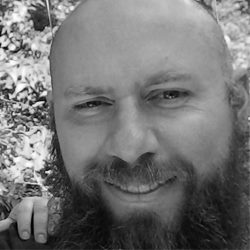
Faculty Focus Friday is a Q&A series that highlights individual faculty members in various academic programs around Spalding University. Today’s featured faculty member is Charles Maynard, Associate Professor of undergraduate writing in the School of Liberal Studies (more faculty bios can be found on the Meet Liberal Arts Faculty page) and Director of the Spalding Writing Center. Professor Maynard is a novelist and writer/creator of role-playing games and card games who is also on the graduate faculty of Spalding’s School of Creative and Professional Writing. He earned his Master of Fine Arts in Writing from Spalding.
What do you like about working and teaching at Spalding?
I like the small class sizes and the opportunity to gravitate to areas where I have strengths, and have people be accepting of that.
What is your academic specialty, areas of expertise or research?
I teach first-year writing, and I run the Writing Center on campus. So my areas of expertise are academic writing and professional writing, and my degrees are in creative writing. So my areas of expertise are all types of writing.
Why is liberal arts a good option for new students to consider as their major?
Liberal arts acts as a foundational element in the life of a learner and creative person. I think it’s important to have that foundation because it supports all of those other things that are built upon it. Liberal studies is focused on finding connections between the past and future and why the past influences the future, looking at historical context, art, literature, diversity and how things shift and evolve over time. I think it’s important for young people to make those connections so that they can see that things were not always like this. How can I take in all that information and synthesize it to recreate the world so that I can make it a better place? I think this degree prepares them with practical elements like learning to write, synthesize thoughts, make connections and apply it to their passions. I think it’s important to realize passion and what drives students, and the faculty in liberal studies tries to focus on that for their students.
What is an interesting thing that you keep in your office?
My wife gave me these glow-in-the-dark stars to put on the wall, and I put them up there. And then I got a desk in my office. I do not know who had the desk before me, but there was a dried banana in the back and it was desiccated and wrinkled, so I put poster gum on the wall and stuck the dried banana to the wall so it would look like the moon with the stars. I made a sign that said organic moon, and then the banana fell behind the cabinet and I couldn’t move it, so the sign is still hanging up and the banana is somewhere in my office.
What is the most rewarding part of your job?
Working with a student in the Writing Center or classroom and see them have major obstacles and then see them start to figure out ways to problem-solve and overcome those obstacles. Once they overcome those obstacles and have that eureka moment, (you can) watch them start to gain some confidence and then watch that evolve as they move through academia and their college experience and then graduate. I like to see that level of accomplishment, that level of confidence and that they succeeded based off the goals they set for themselves.
At Spalding, we like to say, “Today is a great day to change the world.” How do you think your role at Spalding is helping you change the world or the world of your students?
I hope they see that I am able to give them the tools to problem-solve, enhance their creativity, expand their desire to know and understand the world around them and themselves. These are positive tools. And I am doing this with some awareness of my place in the world and the lens I see the world through and myself through, so I am changing around them as well. I hope I am equipping them to be more conscious and aware human beings in their interactions with themselves and the world around them. It’s the little pieces or building blocks that multiple instructors, support units and conversations serve to build, so the student can reflect on it to help reduce conflict.